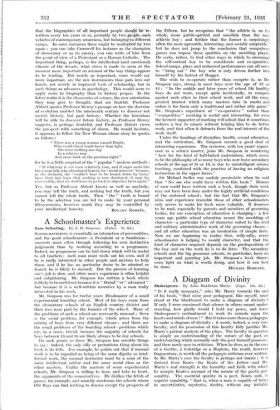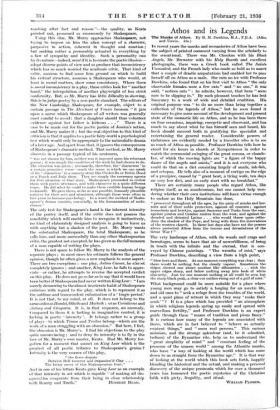A Diagram of Divinity
Shakespeare. By John Middleton Murry. (Cape. 12s. 6d,) 't Is it really necessary," cries Mr. Murry towards the end of his book, " that some poor pedagogue, like myself, must stand at the blackboard to make a diagram of divinity ? If only I were convinced that silence in others 'meant under- standing, how gladly would I hold my peace, and leave Shakespeare's enchantment to work its miracle' upon the hearts and minds of men I " But it takes more than a pedagogue to make a diagram of divinity ; it needs, indeed, a very rare faculty, and his possession of this faculty fully justifies Mr. Murry's patient analysis of the plays. The faculty in question is simply an understanding of the nature of the poet, an understanding which normally only the poet himself possesses. and then rarely uses in criticism. When he does, as in the case of a Goethe, a Coleridge or a Hopkins, the result, however fragmentary, is worth all the pedagogic criticism ever written. In Mr. Murry's case the faculty is perhaps not innate ; it is derived from Keats—the Keats of the Letters—and Mr. Murry's real strength is the humility and faith with which he accepts Keats's account of the nature of the poetic per- sonality. The essential quality in a poet, Keats said, is negative capability, " that is when a man is capable of being in uncertainties; -myStetteS, delibts, without any irritable reaching after fact and reason "—the quality, as Keats pointed out, possessed so enormously by Shakespeare. Using this clue, Mr. Murry approaches Shakespegre, not trying to impose on him the alien concept of a.sharacter, purposive in action, coherent in thought and en-lotion ; but seeking rather a personality actuated in everything by a -law of sympathy and identity. -Such a personality can by its nature—indeed, must if it is to create the poetic illusion— adopt diverse points of view and so produce that inconsistency which has so much worried the academic critic. That kind of critic, anxious to find some firm ground on which to build his critical structure, assumes a Shakespeare who would, at least in moral matters, show some consistency. Where there is moral inconsistency in a play, these critics look for " another hand," the interpolation of another playwright of less strict.
conformity. But, as Mr. Murry has little difficulty in showing, this is to judge poetry by a non-poetic standard. The editors of the New Cambridge Shakespeare, for example, object to a certain passage in The Merchant of Venice because " it jars upon a nerve which Shakespeare of all writers was generally most careful to avoid : that a daughter should thus volunteer evidence against her father is hideous . . " There is a ease to be made out for the poetic justice of Jessica's action, and Mr; Murry makes it ; but the real objection to this kind of criticism is that it applies to a poetic fairy-world a psychological test which would only be appropriate to the naturalistic diiuna of a later age. And apart from that, it ignores the consequences of Shakespeare's dramatic method. That method, as Mr. Murry observes in a passage typical of his acuteness, " was not chosen by him, neither was it imposed upon his reluctant genius ; it was simply the condition of the work he had chosen to do. The situation was given ; necessarily, therefore, the ' characters ' in a certain primitive sense—much the sense in which we can speak of the characters ' in a nursery-story like Cinderella or Robin Hood or a Punch and Judy show. They are simply the necessary agents for that situation or that story. Shakespeare proceeded to endow them with poetic utterance, and with character in a quite different sense. He did whet ho could to rnake.them credible human beings to himself. He gave them, as far as was possible, humanly plausible motives for their acts and situations, although-these were often- in fact prior to humane psychology. In a word, the method of Shake- speare's drama consists, essentially, in the humanisation of melo- drama."
The only test for Shakespeare's hand is -the inherent intensity of the poetry itself, and if the critic does not possess the sensibility which will enable him to recognise it instinctively, no kind of elaborately designed analysis is going to leave us with anything but a shadow of the poet. . Mr. Murry wants the substantial Shakespeare, - the total Shakespeare, as he calls him, and more successfully than any other Shakespearian critic, the greatest not excepted, he has given us the full measure of a man capable of writing the. plays.
There is not space to follow Mr. Murry in the analysis of the separate. plays ; in most cases his estimate follows the-general opinion, though he often gives a new emphasis to some aspect. There are two exceptions : one play, Julius Caesar, he almost completely ignores ; and another, King Lear, he fails to appre- ciate—or rather, he attempts to reverse the accepted verdict on this play. He does not go so far as to say that it would have I een better if Shakespeare had never written King Lear : " Ism 'nerdy demurring to the almost inveterate habit of Shakespeare criticism with regard to the play, which is to represent it as the sublime and transcendent culmination of a tragic period.' It is not that, to my mind, at all. It does not belong to the same order as Hamlet, Othello and Macbeth ; or as Coriolanus and Antony and Cleopatra. It is, in that sequence, an anomaly. Compared to them it is lacking in imaginative control, it is lacking in poetic intensity '. It belongs rather to a group of plays—to which Timon and Troilus belong—which are the work of a man struggling with an obsession." But here, I feel, the obsession is Mr. Murry's. I find his objections to the play quite unconvincing ; and to deny its intensity is to fly in the face of Mr. Murry's own master, Keats. Had Mr. Murry for- gotten for a moment that sonnet on King Lear which is the greatest of all poetic tributes to Shakespeare's genius ? Intensity is the very essence of this play, " the fierce dispute
Betwixt Hell torment and impassion'd Clay . . .
The bitter sweet of this Shakespearian fruit."
And in one of his letters Keats gave King Lear as an example of that intensity in art which is capable " of making all dis- agreeaties evaporate from their being in close relationship















































 Previous page
Previous page